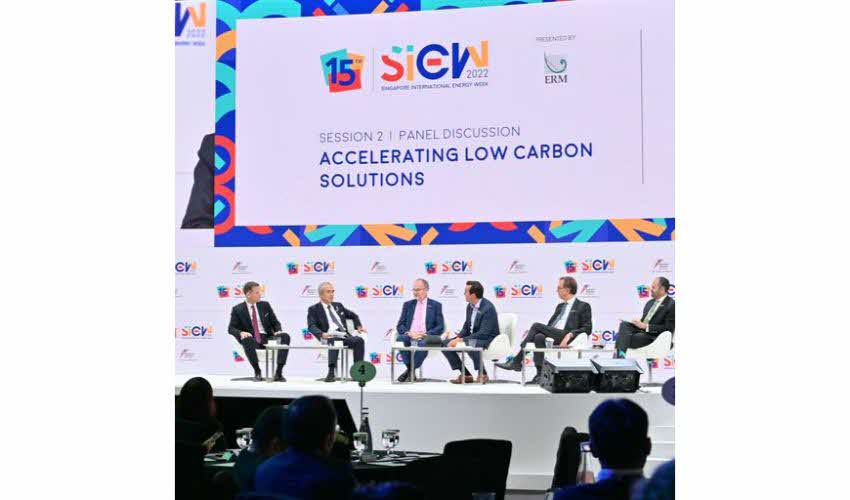How can corporates and governments catalyse the development of supply chains for low-carbon solutions? Panellists at the Singapore Energy Summit discussed their perspectives on the role of public and private sectors in driving accelerated adoption of low carbon solutions. Lim Wen Bin, head of renewable ASPAC, KPMG Singapore, reports. This article is contributed by KPMG - the official Content Partner for SIEW 2022.

In Session 2 of the Singapore Energy Summit, industry experts and government leaders discussed the available low carbon technology options and what it takes to accelerate the adoption of these low carbon solutions to facilitate the energy transition.
His Excellency Arifin Tasrif, Minister of Energy and Mineral Resources, Indonesia, opened the session with a call to action that climate commitments must be followed by joint initiatives and collaboration in the region. He further emphasised the importance of climate imperatives and iterated Indonesia’s commitment to its climate goal of reducing its carbon emission by 29% in 2030 from its business-as-usual baseline.
His Excellency shared the various initiatives and collaborations that the Indonesian government is embarking on to deliver its decarbonisation commitment, including:
- Development of gas as a transition fuel. Indonesia continues to have abundant gas resources and the cleanest fossil fuel, that it can provide to the region to support Asian countries in their energy transition.
- Encourage the development of low carbon fuels, including biofuel. For example, the country has mandated B30 biofuel and is planning to further increase to B40.
- Decarbonisation of the transport sector. The government has set ambitious targets to increase the adoption of electric vehicles as well as explore the introduction of hydrogen for trucks by 2025 should it be feasible.
- Decarbonisation of industrial sectors. Indonesia is assessing the potential deployment of carbon capture storage (CCS). The country has depleted oil and gas fields suitable as carbon storage hubs for the region.
- Decarbonisation of the power generation sector. Indonesia is implementing a programme to convert diesel-based generation to gas or renewables. It is also exploring the feasibility of ammonia co-firing and early retirement of coal thermal power stations.
- Development of renewable resources including wind, solar, hydro, and pump hydro which Indonesia has significant potential for. The government is studying nuclear as an option as well.
- Connecting island grids. The country is planning on interconnecting 5 island grids through high voltage transmission lines to allow transmission of low carbon generation from renewable resource-rich regions to meet the demands of regions with dense populations.
- Regulation. The government has implemented various regulations to support the adoption of low carbon energy.This includes the Presidential Regulation of 2022 on the acceleration of renewable energy development for power supply, draft renewable energy bill, carbon capture storage, and carbon pricing including cap and trade mechanism.
Moderating the panel discussion, Michael Ottaviano, Managing Partner of ERM, opened by commenting on the wide range and spectrum of possible low carbon technologies and solutions.
The panellist members shared their respective low carbon solutions focus areas. These ranged from nuclear safety by Dr Jean-Christophe Niel, Director General of the Institute for Radiological Protection and Nuclear Safety (IRSN), to carbon neutral gas by Kazuhisa Yano, Executive Chairman of Osaka Gas Singapore, to hydrogen and carbon capture technology by Matthieu Giard, Vice President, Member of the Executive Committee of Air Liquide and Irtiza H. Sayyed, President of ExxonMobil Indonesia. The Hon Bill Johnston MLA of Western Australia further noted the importance of renewable integration and microgrid as a key focus area to scale up the adoption of low carbon solutions.
On the topic of scaling up the development of hydrogen, Matthieu shared his perspective on 4 necessary elements -- external carbon pricing (in form of a carbon tax or other instruments), capital to scale up investment, regulation (setting unified standards and certification), and partnership as no single party can bring the entire end-to-end solutions and capability required to implement hydrogen.
Dr Jean shared his view on the practicality of nuclear, in particular, Small Modular Reactor (SMR), its advantages and current development. Relative to conventional nuclear technology, SMR typically has a smaller capacity than 300MWe and brings the benefits, over the traditional larger reactors, that are inherent to the nature of their small and modular design. For example, the potential for overheating and ease of intervention when such accidents occur is lower. However, its actual, and perceived, safety concerns are yet to be properly understood which would benefit from further public consultation supported by robust science-based risk and safety analysis.
Irtiza shared that carbon capture is not a new technology. In fact, it has been employed by ExxonMobil for over 40 years – in the past for operational integrity such as maintaining the pressure level, and today for climate and environment.
On the topic of hydrogen versus electric vehicles, the panellist generally shared the consensus that there is no clear choice. The appropriate technology and application likely will be dependent on the end-use case in point – with electric vehicles able to meet the passenger vehicle needs, and hydrogen potentially better suited for heavy vehicles or shipping. Yano-san from Osaka further noted the third option of an LNG-fuelled vehicle which utilises gas as a cleaner form of fuel to support the transition.
The panel concluded the discussion on the important role that the government plays in providing a conducive regulatory and policy environment to enable the scaling up and implementation of low carbon solutions. Yano-san further commented on the need for reviewing existing Intergovernmental Panel on Climate Change (IPCC) guidelines to clarify recognition and support for the adoption of carbon capture storage and carbon recycling solutions.
Follow us on Twitter (@SIEW_sg) to get the latest #SIEW2022 updates throughout the day!